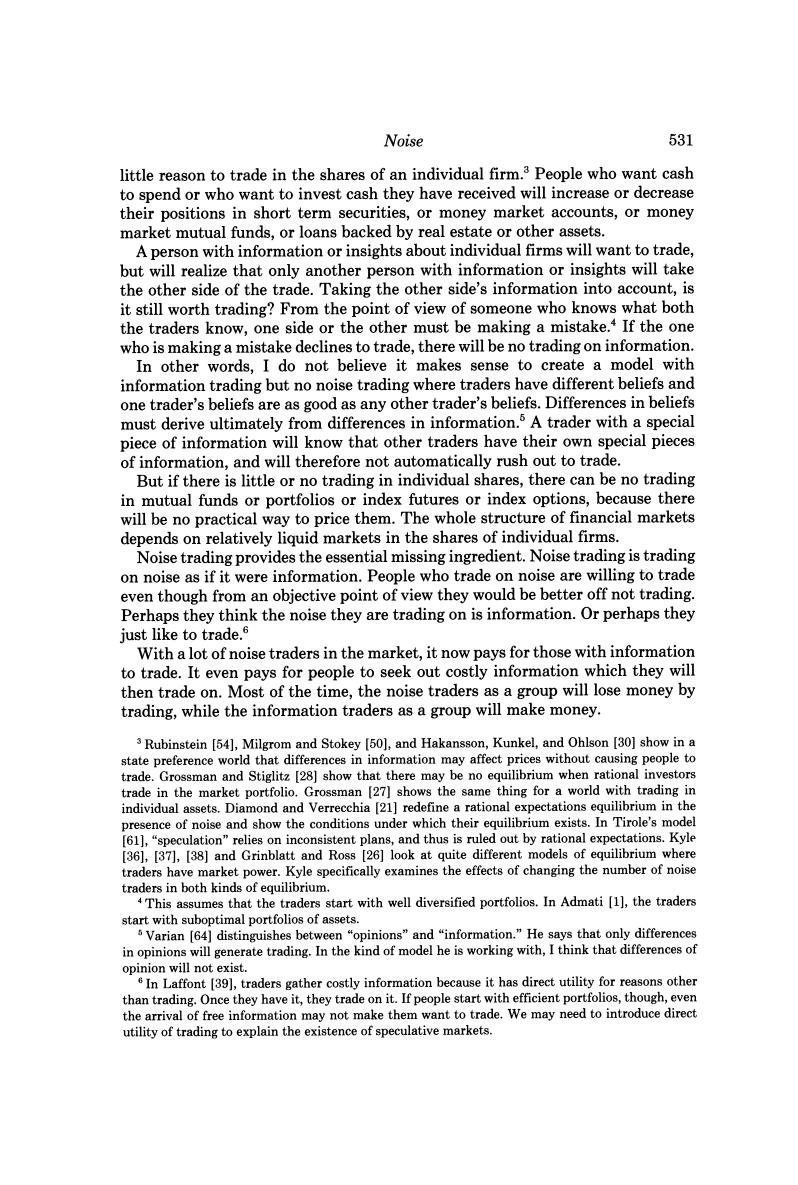正在加载图片...

Noise 531 little reason to trade in the shares of an individual firm.3 People who want cash to spend or who want to invest cash they have received will increase or decrease their positions in short term securities,or money market accounts,or money market mutual funds,or loans backed by real estate or other assets. A person with information or insights about individual firms will want to trade, but will realize that only another person with information or insights will take the other side of the trade.Taking the other side's information into account,is it still worth trading?From the point of view of someone who knows what both the traders know,one side or the other must be making a mistake.+If the one who is making a mistake declines to trade,there will be no trading on information. In other words,I do not believe it makes sense to create a model with information trading but no noise trading where traders have different beliefs and one trader's beliefs are as good as any other trader's beliefs.Differences in beliefs must derive ultimately from differences in information.5 A trader with a special piece of information will know that other traders have their own special pieces of information,and will therefore not automatically rush out to trade. But if there is little or no trading in individual shares,there can be no trading in mutual funds or portfolios or index futures or index options,because there will be no practical way to price them.The whole structure of financial markets depends on relatively liquid markets in the shares of individual firms. Noise trading provides the essential missing ingredient.Noise trading is trading on noise as if it were information.People who trade on noise are willing to trade even though from an objective point of view they would be better off not trading. Perhaps they think the noise they are trading on is information.Or perhaps they just like to trade.6 With a lot of noise traders in the market,it now pays for those with information to trade.It even pays for people to seek out costly information which they will then trade on.Most of the time,the noise traders as a group will lose money by trading,while the information traders as a group will make money. 3 Rubinstein [54],Milgrom and Stokey [50],and Hakansson,Kunkel,and Ohlson [30]show in a state preference world that differences in information may affect prices without causing people to trade.Grossman and Stiglitz [28]show that there may be no equilibrium when rational investors trade in the market portfolio.Grossman [27]shows the same thing for a world with trading in individual assets.Diamond and Verrecchia [21]redefine a rational expectations equilibrium in the presence of noise and show the conditions under which their equilibrium exists.In Tirole's model [61],"speculation"relies on inconsistent plans,and thus is ruled out by rational expectations.Kyle [36],[37],[38]and Grinblatt and Ross [26]look at quite different models of equilibrium where traders have market power.Kyle specifically examines the effects of changing the number of noise traders in both kinds of equilibrium. +This assumes that the traders start with well diversified portfolios.In Admati [1],the traders start with suboptimal portfolios of assets. Varian [64]distinguishes between "opinions"and "information."He says that only differences in opinions will generate trading.In the kind of model he is working with,I think that differences of opinion will not exist. e In Laffont [39],traders gather costly information because it has direct utility for reasons other than trading.Once they have it,they trade on it.If people start with efficient portfolios,though,even the arrival of free information may not make them want to trade.We may need to introduce direct utility of trading to explain the existence of speculative markets